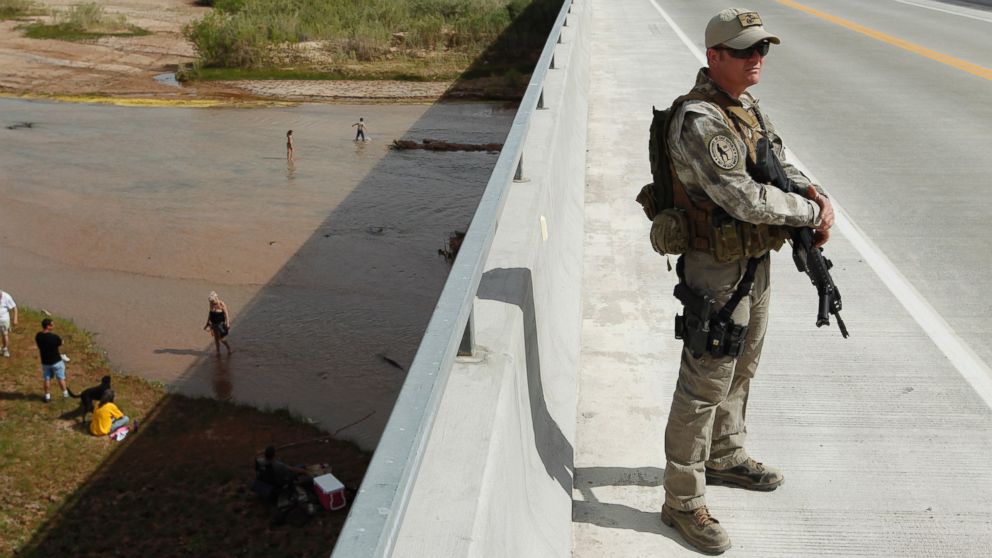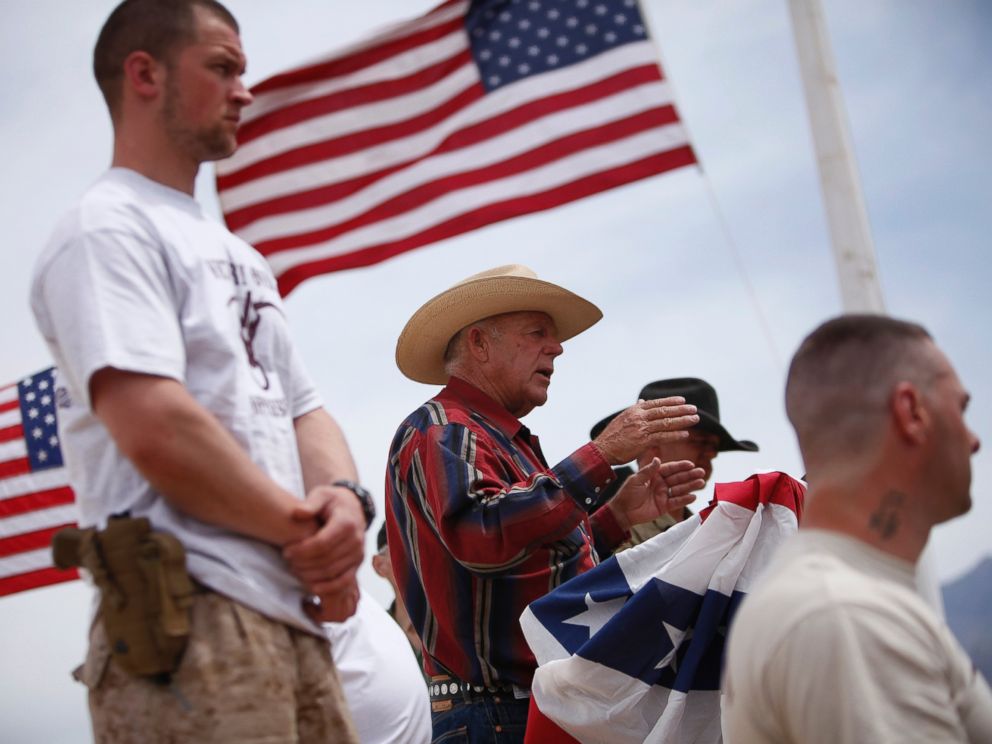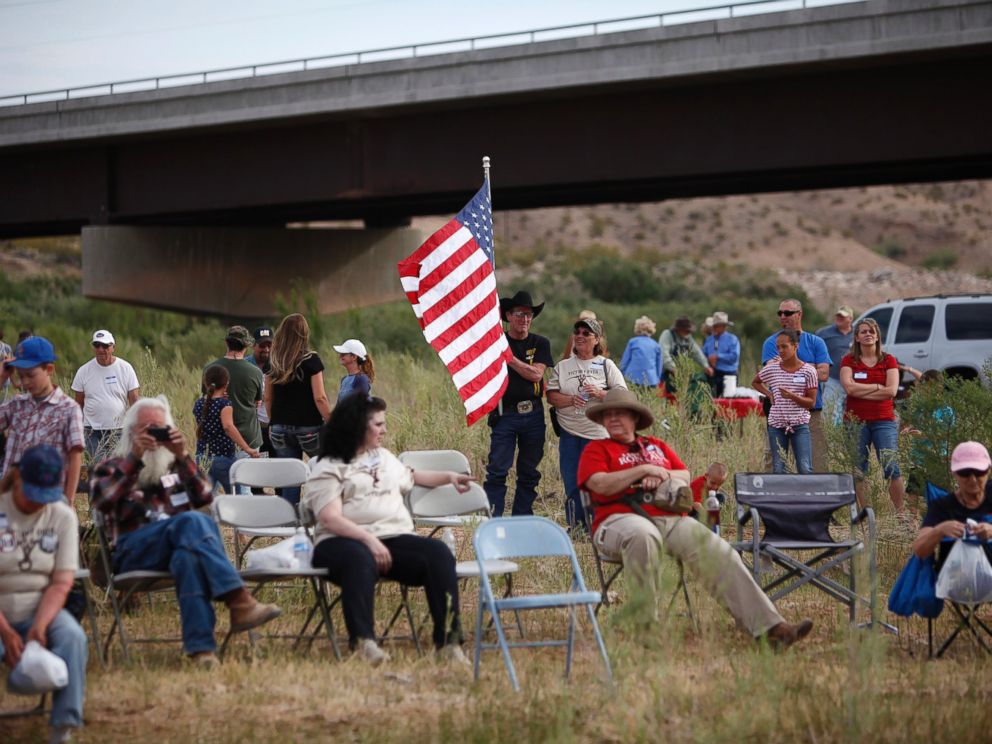Civilian Militia Remains at Bundy Ranch After Standoff Ends

A group of armed militia and protesters, some sporting nametags reading
"domestic terrorist," remain camped out on a cattle ranch in Nevada,
where they have been purportedly defending the property since a tense
showdown ended with the federal government last week.
A 20-year struggle between rancher Cliven Bundy and the Bureau of Land
Management over decades of alleged illegal cattle grazing on public land
ended last Sunday, with the government backing down from a
controversial week-long cattle round-up.

The BLM defused the standoff, citing safety concerns for its employees
and the protesters, some of whom were on horseback and others who were
set up in sniper positions on the Interstate 15 overpass pointing
military-style rifles at federal agents. Among the citizen army were
dozens of women and children under the overpass who could have been
caught in the line of any possible gunfire.
But many people who say they support Bundy said they felt the battle was
far from over, as evidenced by some responses ABC News received on
social media, after the BLM first announced on April 12 that it was withdrawing from the area and releasing the 380 cattle already collected as part of the round-up on an area of land half the size of Delaware state.
@libertyideals @lianzifields No, just a pull back to retrench and attack again. This is a diversionary tactic. They will be back.— Bossy for Bundy (@BeckyJoSpray) April 12, 2014
The government maintains that Bundy owes more than $1.1 million in
unpaid trespass fees and penalties after letting his herd of some 900
cattle graze on federal land near the town of Bunkerville, about 80
miles northeast of Las Vegas, for the last 20 years.
Agency officials also told The Associated Press that the roundup contract was $900,000.
The BLM said it would now move to resolve the matter "administratively
and judicially," although the government has unsuccessfully gone head to
head with Bundy in Court since 1993, after it established the area as a
protected habitat for the endangered desert tortoise and slashed
Bundy's cattle allotment.
When Bundy refused to pay his grazing fees, the agency cancelled his permit, a move later upheld by federal judges.
"I have no contract with the United States government," Bundy said. "I
was paying grazing fees for management and that's what BLM was supposed
to be, land managers, and they were managing my ranch out of business,
so I refused to pay."
@ABC @lianzifields seriously doubt this is over. He either pays rent like he should or they will come back next time prepared and look out!— Carmen Scherubel (@RealtorCarmen) April 14, 2014
In the days leading up to the government's withdrawal, the movement had
reportedly grown to 600 men, women and children, although conflicting
counts emerged from the two sides. Demonstrators rallied together,
bonding by campfires at night, while local protest leaders warned people
not to wear camouflage and to keep their weapons inside their vehicles.
A group from those supporters, some who had ventured across state lines
to support Bundy and his family, stayed behind to guard the
67-year-old's melon farm and cattle ranch.
The nametags worn by a few supporters came in response to Sen. Harry Reid's, D-Nev., comments on Thursday labelling them "domestic terrorists."
One of the armed and camouflaged men, a former Marine sergeant who said
he was leading a Bundy security detail of 40 people or so, told the AP
he considers protecting the ranch as a patriotic duty.
Civilian Militia Remains at Bundy Ranch After Standoff Ends
"There are people out here who will sacrifice their lives and their
fortunes and their sacred honor to defend them," said Jerry DeLemus from
New Hampshire. "If someone points a gun at me, I'll definitely point my
gun back."
The dispute has reignited debate over BLM practices, especially where it
controls vast areas of land in the West. The issue of states' rights
has long been disputed in Nevada, where more than 85 percent of land is
controlled by federal mark, military and land agencies.
"People are getting tired of the federal government having unlimited power," Bundy's wife, Carol Bundy told ABC News.

Both sides said the issue is one of fairness, with the federal
government maintaining that thousands of other cattle ranchers are
abiding by the law by paying their annual grazing fees.
The remaining campers on the Bundy ranch told the AP they have no plans
to leave and believe they are being watched by government drones and
helicopters.
"We stay until the Bundys tell us we can go home," said Jack Commerford, a friend of DeLemus' from New Hampshire.
No comments:
Post a Comment